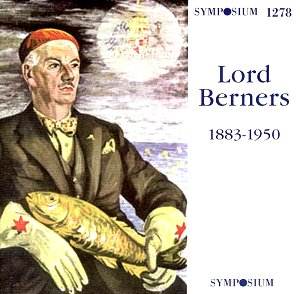
Lord BERNERS (1883-1950)
Polka (1941)
Peter Dickinson (piano)
Lieder Album; Three Songs in the German
Manner (1913-18)
Meriel Dickinson (mezzo soprano) and Peter Dickinson
(piano)
Fragments Psychologiques (1915)
Peter Dickinson (piano)
Dialogue between Tom Filuter and his Man,
by Ned the Dog Stealer (1921)
Bernard Dickerson (tenor) and Richard Rodney
Bennett (piano)
Three Songs (1920)
Meriel Dickinson (mezzo soprano) and Peter Dickinson
(piano)
Le Poisson d’Or (1915)
Susan Bradshaw (piano)
Red Roses and Red Noses (c1941)
Meriel Dickinson (mezzo soprano) and Peter Dickinson
(piano)
Trois Petites Marches Funèbres (1916)
Susan Bradshaw (piano)
Trois Chansons (1920)
Meriel Dickinson (mezzo soprano) and Peter Dickinson
(piano)
Valses Bourgeoises (1919)
Susan Bradshaw (piano) and Richard Rodney Bennett
(piano)
Dispute entre le Papillon et le Crapaud (c.1914)
Susan Bradshaw (piano)
Three Songs – Sea Shanties (1921)
Bernard Dickerson (tenor) and Richard Rodney
Bennett (piano)
Come on Algernon (1944)
Meriel Dickinson (mezzo soprano) and Peter Dickinson
(piano)
Fanfare; composed for the Musicians’
Benevolent Fund
Kneller Hall Musicians conducted by Captain
A E Adkins
Nicholas Nickleby – incidental music
from the film
Philharmonia Orchestra conducted by Ernest Irving
Les Sirènes – ballet music
Philharmonia Orchestra conducted by Ernest Irving
Les Sirènes – Prelude, Mazurka and Polka
![]() Lord Berners (piano)
Lord Berners (piano)
Recorded 1977 and originally released on Unicorn-Kanchana
except Fanfare, recorded 1934, Nicholas
Nickleby – incidental music and Les Sirènes
– ballet music, recorded 1947, Les Sirènes
– Prelude, Mazurka and Polka recorded c.1946
![]() SYMPOSIUM 1278 [79.40]
SYMPOSIUM 1278 [79.40]
BUY NOW
AmazonUK AmazonUS